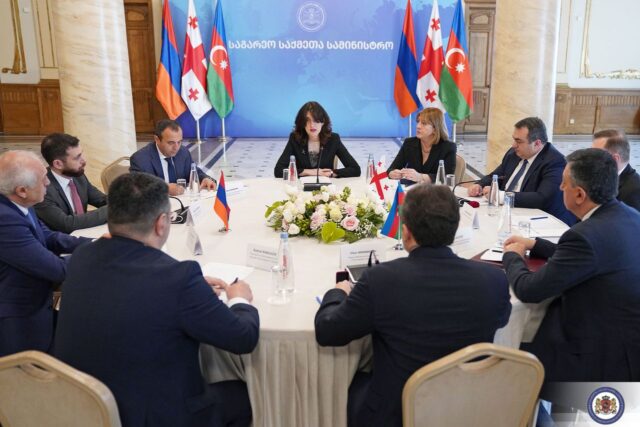
Azerbaijan-Armenia-Georgia Trilateral Format May be Platform for Regional Decision-Making
Publication: Eurasia Daily Monitor Volume: 22 Issue: 60
By:

Executive Summary:
- Georgia hosted the foreign ministers of Armenia and Azerbaijan on April 17 for a closed trilateral summit to strengthen mutually beneficial cooperation between the countries and geopolitical stability of the South Caucasus.
- Armenia and Azerbaijan’s progress, albeit slow, in signing a peace agreement over disputed territories remains a signal of their interest in constructing neighborly relations and may be aided by the trilateral cooperation format.
- The new format is yet another demonstration that the South Caucasus states are shifting their foreign policies and attempting to gain autonomy as regional, trilateral decision-makers while reducing reliance on external powers such as Russia and Iran.
On April 17, Tbilisi hosted a closed trilateral meeting between Georgia, Azerbaijan, and Armenia. The main goal of the meeting was to share the common interests and views of the three countries that will contribute to the strengthening of mutually beneficial cooperation and geopolitical stability of the South Caucasus (Georgian Ministry of Foreign Affairs of Georgia, April 17). Additionally, the summit aimed to build a new format for regional cooperation on top of the already existing web of partnerships and alliances spanning the region.
In attendance were the Deputy Foreign Minister of Georgia, Lasha Darsalia, the Deputy Foreign Minister of Azerbaijan, Elnur Mammadov, and the Deputy Foreign Minister of Armenia, Vahan Kostanyan, and members of their delegations (1tv.ge, April 17). According to the Ministry of Foreign Affairs of Georgia, the meeting was opened by Georgia’s Foreign Minister Maka Bochorishvili, who spoke about the strategic role of the South Caucasus, its potential, and the room for cooperation formats (Georgian Ministry of Foreign Affairs, April 17). Bochorishvili argued that Georgia sincerely desires to contribute to the development of regional cooperation in the South Caucasus, which still needs to fully realize its geopolitical role.
After the summit, the foreign ministers issued a joint statement explaining that the “meeting served as an open exchange of views and presentation of visions on potential areas for collaboration” (Georgian Ministry of Foreign Affairs of Georgia, April 17). The summit is considered the first trust-building step between Georgia, Armenia, and Azerbaijan for the “eventual advancement” of future, higher-level dialogue.
This is not the first time foreign ministers of Armenia and Azerbaijan have gathered in Tbilisi. On July 16, 2022, the then-Foreign Minister of Georgia, Ilia Darchiashvili, hosted a meeting between the Ministers of Foreign Affairs of Armenia, Ararat Mirzoyan, and of Azerbaijan, Jeyhun Bayramov (Armenian Ministry of Foreign Affairs, July 16, 2022). At the time, however, geopolitical circumstances in the South Caucasus differed from today’s. Peace between Baku and Yerevan seemed a distant possibility as Azerbaijan’s control over the Nagorno-Karabakh region remained elusive (see EDM, March 16, August 17, 2022). Moreover, Georgia’s foreign policy was not as flexible for mediating between Azeerbaijan and Armenia as it is now, and Armenia’s frustration with Russia was less prevalent than today (Armenpress, October 2, 2024; see EDM, January 28).
All three South Caucasus states have now structurally shifted foreign policies. Georgia’s traditional pro-Western approach has given way to a multi-vector foreign policy whereby Tbilisi has tried to build equidistant ties with major players such as Türkiye, the People’s Republic of China (PRC), the European Union—despite recent moves away from the West—and even Russia (see EDM, August 10, 2023; Civil Georgia, July 18, 2024). Armenia has pursued a multi-vector foreign policy and attempted to minimize its security, military, and political dependence on Russia (see EDM, August 5, 2024, January 28). Azerbaijan has always tended to build close ties with several big actors simultaneously, and since 2022, the trend has only solidified (see EDM, February 28, April 2, 2024).
Overall, the trend toward greater autonomy in foreign policy has allowed the South Caucasus countries to exercise trilateral agency to determine the direction of the region and decide matters in a trilateral manner. Despite Baku, Tbilisi, and Yerevan individually lacking geopolitical weight to outmaneuver their larger neighbors, the emerging willingness to cooperate trilaterally to overcome traditional fault lines is a big step forward. The South Caucasus has traditionally been characterized as a fractured region, as all three states pursued varying and often incompatible foreign policies, which in turn inhibited substantive regional cooperation.
Global geopolitical circumstances allow for a trilateral framework to emerge in the South Caucasus largely because of the definitive progress on a peace agreement between Armenia and Azerbaijan (Azertec, March 13; see EDM, March 24; Armenpress, April 15). The actual signing might not take place in the coming weeks or even months, but progress toward this end indicates that Baku and Yerevan are willing to build neighborly relations, or at least resolve their decades-long territorial disputes.
Cautious optimism is necessary as the peace agreement, and thereby trilateral cooperation between the three South Caucasus states, may still fail. Since the 1990s, the South Caucasus has never been an area conducive to pan-regional frameworks. Distrust between Baku and Yerevan still runs high, and there is always a potential for major military clashes along the border (see EDM, March 24). Russia’s war against Ukraine and any progress on peace negotiations, as well as other uncertainties around Iran’s nuclear program, will also affect the security situation in the South Caucasus given the region’s proximity to and different relations with Russia, Ukraine, and Iran (see EDM, March 27, 2024, January 25, 28, February 6, March 17, April 23).
The trilateral format between Georgia, Armenia, and Azerbaijan represents a promising direction in regional cooperation. If properly realized, it will allow the three South Caucasus states greater maneuverability in foreign relations and increase their geopolitical weight in the new regional balance of power relative to states such as Iran and Russia. The trilateral format holds the potential to enable the three states to withstand external pressure and potentially further facilitate cooperation across the South Caucasus.



